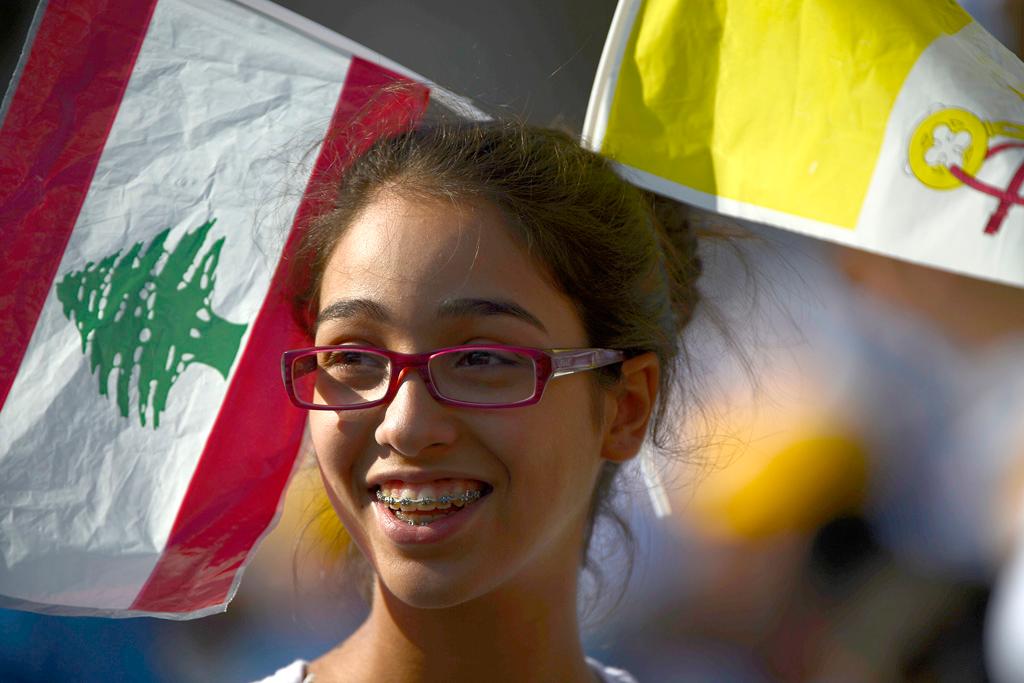Pope praises Lebanon’s example for all Middle East
A girl smiles as she waits in the Lebanese mountain village of Bkerke, overlooking the capital Beirut, for the arrival of Pope Benedict XVI on September 15, 2012. Pope Benedict XVI urged Middle Eastern Christians and Muslims to forge a harmonious, pluralistic society in which the dignity of each person is respected and the right to worship in peace is guaranteed.
Pope Benedict XVI praised Lebanon’s religious tolerance and diversity today as an example for the entire Middle East as his toured the country for a second day.
Speaking to government, religious and social leaders, Benedict said the freedom to worship forms the foundation for many other liberties.
He said other countries should look to Lebanon’s history of families of mixed religion.
“If it is possible in families why not in entire societies? … Let us not forget that religious freedom is a fundamental right from which many other rights stem,” the pontiff said, according to The Associated Press.
Practicing religion “without danger to life and liberty must be possible to everyone,” Benedict added.
Lebanon is a country of more than 4 million people, the majority of whom are Muslim – Sunni, Shi’ite or Alawite.
More than 1.3 million Christians – following over 12 different churches – live in Lebanon, according to Reuters.
For example, Benedict spoke with Lebanese President Michel Suleiman (a Maronite Christian), Sunni Prime Minister Najib Mikati and parliamentary speaker Nabih Berri, a Shi’ite.
More from GlobalPost: Mob torches KFC, Hardee’s as pope arrives in Lebanon
The country survived a sectarian civil war that raged from 1975 to 1990.
Thousands, not all of them Christians, lined Lebanon’s streets to greet the pope as he drove past in his bulletproof Pope mobile.
“We came to support the pope and also get support from him, because our experience has been that when we listen to him, we are touched and we are helped in our lives,” Muslim Amira Chabchoul told Reuters.
Benedict’s visit came as protests raged across the Middle East, including Lebanon, in reaction to a low-budget film made in the US called “The Freedom of Muslims.”
The film casts the Prophet Muhammad as an abusive figure; it’s said to have triggered an armed mob into storming the US consulate in Benghazi earlier this week.
The militants killed US Ambassador to Libya Chris Stevens and three of his staff.
While he didn’t name it directly, the pope also alluded to problems in Syria.
“There are countries suffering from poverty, unemployment and terrorism leading to unacceptable pain for people who turn into victims,” he said. “Every human being is a member of humanity; we must try to unite and spread the culture of peace and family values, through teaching children the meaning of peace at school and at home.”
More from GlobalPost: Providing weapons to Syria a ‘grave sin,’ pope warns
The story you just read is accessible and free to all because thousands of listeners and readers contribute to our nonprofit newsroom. We go deep to bring you the human-centered international reporting that you know you can trust. To do this work and to do it well, we rely on the support of our listeners. If you appreciated our coverage this year, if there was a story that made you pause or a song that moved you, would you consider making a gift to sustain our work through 2024 and beyond?
